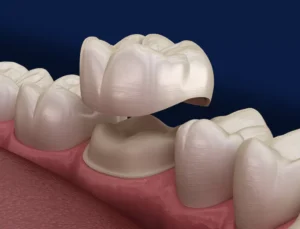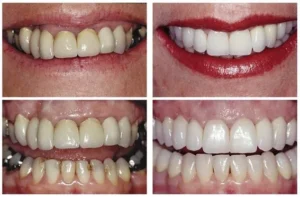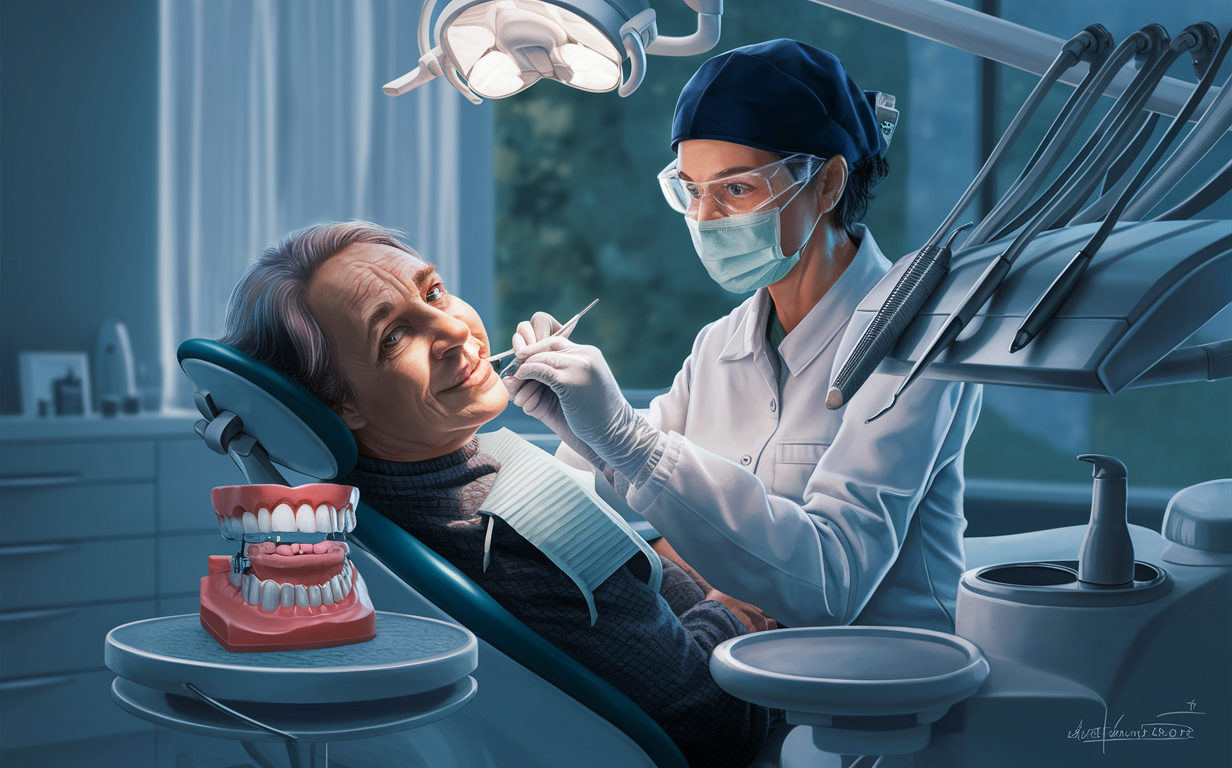Dental crowns and bridges are essential dental procedures that restore the function and appearance of damaged teeth. Whether you are dealing with tooth decay, a cracked tooth, or missing teeth, understanding how crowns and bridges work can help you make an informed decision about your dental health.
Key Takeaways
- Dental crowns are custom-made caps placed over damaged teeth to restore their shape, size, strength, and appearance.
- Dental bridges consist of one or more artificial teeth (pontics) anchored by crowns on adjacent teeth, filling in gaps left by missing teeth.
- Both Dental crowns and bridges preserve dental function and improve aesthetics, playing a crucial role in oral health maintenance.
- Dr. Kyle Ford at Inspire Dental in Ottumwa, Iowa, specializes in these procedures, ensuring personalized care for every patient.
What Are Dental Crowns?

A dental crown is essentially a tooth-shaped cap that is placed over a damaged tooth. The purpose is to restore the tooth’s shape, strength, and functionality. Crowns are made from various materials, including porcelain, ceramic, metal, and resin, and are designed to match the color and texture of your existing teeth.
When Is a Crown Needed?
Crowns are often recommended in the following scenarios:
- Severely Decayed Teeth: When a filling is not sufficient to restore a tooth.
- Cracked or Broken Teeth: To protect and hold together parts of a cracked tooth.
- After a Root Canal: To cover and strengthen a tooth following a root canal treatment.
- Cosmetic Modifications: To improve the appearance of misshapen or discolored teeth.
Types of Dental Crowns
| Type of Crown | Material Used | Durability | Aesthetics |
|---|---|---|---|
| Porcelain | High-quality ceramic | Moderate | Excellent |
| Metal | Gold or metal alloys | High | Poor (metallic appearance) |
| Porcelain-Fused-to-Metal | Combination | High | Good |
| Resin | Composite resin | Moderate | Good |
Advantages and Disadvantages of Crowns

Advantages:
- Durability: Crowns can last many years with proper care.
- Natural Appearance: Porcelain crowns can be made to look just like natural teeth.
- Function Restoration: Helps in chewing and speaking effectively.
Disadvantages:
- Cost: Crowns can be expensive, especially if made from high-quality materials.
- Tooth Sensitivity: Some patients experience temporary sensitivity post-procedure.
What Are Dental Bridges?

A dental bridge is a fixed prosthetic device that replaces one or more missing teeth. It is anchored by crowns on adjacent natural teeth or implants, known as abutments, and fills the gap with artificial teeth called pontics.
Why Opt for a Bridge?
Bridges are recommended to:
- Restore Your Smile: Improve aesthetics by filling gaps left by missing teeth.
- Maintain Facial Shape: Prevent the sunken appearance that can occur with missing teeth.
- Distribute Bite Forces: Properly distribute the bite force across all teeth.
- Prevent Teeth Shifting: Avoid movement of remaining teeth into the empty spaces.
Types of Dental Bridges
| Type of Bridge | How It’s Anchored | Durability | Aesthetics |
|---|---|---|---|
| Traditional Bridge | Crowns on adjacent teeth | High | Good |
| Cantilever Bridge | Crown on one adjacent tooth | Moderate | Good |
| Maryland Bridge | Metal or porcelain wings bonded to adjacent teeth | Moderate | Moderate |
| Implant-Supported Bridge | Anchored by dental implants | High | Excellent |
Benefits and Drawbacks of Bridges
Benefits:
- Natural Look: Modern bridges can be made to look very natural.
- Functional Restoration: Bridges restore chewing and speaking abilities.
- Long-Lasting: With good care, bridges can last many years.
Drawbacks:
- Initial Cost: Bridges can be costly upfront.
- Potential for Decay: The teeth adjacent to the bridge can develop decay if not properly maintained.
The Procedure for Dental Crowns and Bridges

Getting a Dental Crown
- Initial Consultation: The first step is a thorough examination by your dentist.
- Tooth Preparation: The damaged tooth is reshaped to fit the crown.
- Impression: An impression of the tooth is taken to create a custom crown.
- Temporary Crown: A temporary crown is placed while the permanent one is made.
- Permanent Crown Placement: The final crown is cemented in place.
Getting a Dental Bridge
- Consultation and Planning: Your dentist will assess your dental health and plan the bridge.
- Tooth Preparation: Adjacent teeth are prepared for crowns.
- Impression: An impression is taken to create the custom bridge.
- Temporary Bridge: A temporary bridge may be placed.
- Placement of Permanent Bridge: The final bridge is adjusted and cemented.
Caring for Your Dental Crowns and Bridges

Proper care is essential to extend the life of your Dental crowns and bridges. Here are some tips:
- Maintain Oral Hygiene: Brush and floss regularly to keep the area around the crown or bridge clean.
- Avoid Hard Foods: Chewing on hard objects can damage your crowns or bridges.
- Regular Dental Visits: Routine check-ups help monitor the condition of your dental restorations.
- Use a Night Guard: If you grind your teeth at night, a night guard can protect your crowns and bridges.
Real-Life Experiences
Many patients have shared their positive experiences with Dental crowns and bridges. For instance, John from Ottumwa had a severely cracked tooth that was causing him pain and embarrassment. Dr. Kyle Ford at Inspire Dental recommended a crown, and John noticed an immediate improvement in both function and appearance.
In another case, Sarah lost a tooth due to an accident and was self-conscious about her smile. Dr. Ford suggested a dental bridge, and Sarah was thrilled with the natural look and feel of the bridge. She felt more confident and could eat her favorite foods again without discomfort.
Cost Considerations
The cost of crowns and bridges can vary based on several factors:
- Material Used: Porcelain and metal crowns tend to be more expensive.
- Complexity of Case: More complex cases may require additional work, increasing the cost.
- Location and Dentist’s Expertise: Prices can vary by region and the dentist’s experience.
Typical Costs:
- Dental Crown: $800 to $1,500 per tooth.
- Dental Bridge: $2,000 to $5,000 depending on the number of teeth involved.
Comparing Dental Crowns and Bridges
| Feature | Dental Crowns | Dental Bridges |
|---|---|---|
| Purpose | Restore damaged teeth | Replace missing teeth |
| Procedure | Single tooth focus | Involves adjacent teeth |
| Durability | High | High |
| Aesthetics | Natural look | Natural look |
| Cost | Moderate to High | High |
FAQs About Dental Crowns and Bridges
- How long do crowns and bridges last? With proper care, both crowns and bridges can last between 10 to 15 years or longer.
- Is the procedure painful? Most patients experience minimal discomfort, and local anesthesia is used during the procedures.
- Can crowns and bridges be replaced? Yes, if they become damaged or worn out, crowns and bridges can be replaced.
- Are there alternatives to bridges? Dental implants are a popular alternative for replacing missing teeth.
- What are the risks? Potential risks include tooth sensitivity, decay under the crown or bridge, and damage to the adjacent teeth.
Conclusion
Dental crowns and bridges are effective solutions for restoring dental function and aesthetics. At Inspire Dental in Ottumwa, Iowa, Dr. Kyle Ford and his team are dedicated to providing personalized, high-quality care to ensure you achieve a healthy, confident smile. Whether you need a crown for a damaged tooth or a bridge to replace missing teeth, you can trust in their expertise and compassion.
Whether you’re dealing with a damaged tooth or missing teeth, understanding your options can help you make the best decision for your dental health and well-being. Don’t hesitate to contact Inspire Dental for a consultation and take the first step towards a healthier smile today!
